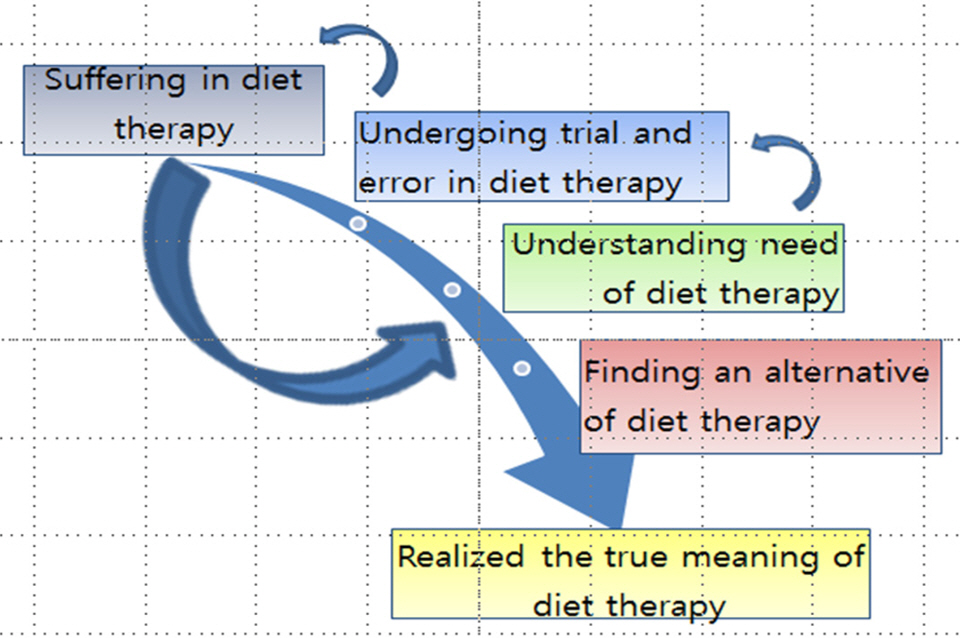1Department of Nursing, Graduate School of Sahmyook University, Seoul
2Department of Nursing, Korea Sahmyook University, Seoul, Korea
Copyright © 2016 Korean Society of Adult Nursing
This is an Open Access article distributed under the terms of the Creative Commons Attribution Non-Commercial License (http://creativecommons.org/licenses/by-nc/3.0) which permits unrestricted non-commercial use, distribution, and reproduction in any medium, provided the original work is properly cited.


Constituents and Subconstituents of Hemodialysis Patients' Experience of Adapting to Dietary Therapy
| Constituents | Participant 1 | Participant 2 | Participant 3 | Participant 4 | Participant 5 |
|---|---|---|---|---|---|
| Dietary therapy as suffering | ․ Suffering from | ․ Suffering from powerlessness under prohibition of eating favorite food to full | ․ Suffering from | ․ Suffering from powerlessness under prohibition of eating favorite food to full | ․ Suffering from |
| - limitation of social activity | - limitation of social activity | - limitation of social activity | |||
| - powerlessness under prohibition of eating favorite food to full | - powerlessness under prohibition of eating favorite food to full | - powerlessness under prohibition of eating favorite food to full | |||
| - being burden to family | |||||
| Undergoing trial and error in dietary therapy | ․ Inappropriate help of family | ․ Eating without realizing the powerlessness | ․ Eating without realizing the powerlessness | ․ Eating without realizing the powerlessness | ․ Searching various methods ․Eating without realizing the powerlessness |
| ․ Eating without realizing the powerlessness | |||||
| ․ Inappropriate help of family | |||||
| Understanding need of dietary therapy | ․ Realized need of dietary therapy by body's reaction | ․ Realized need of dietary therapy by body's reaction | ․ Realized need of dietary therapy by body's reaction | ․ Realized need of dietary therapy by body's reaction | ․ Realized need of dietary therapy by body's reaction |
| ․ Reprimanded of dietary therapy by health care provider | ․ Own enlightenment of the need for dietary therapy by weight gain | ․ Own enlightenment of the need for dietary therapy by weight gain | |||
| ․ Own enlightenment of the need for dietary therapy by weight gain | |||||
| Finding an alternative of dietary therapy | ․ Change positive thinking of dietary stress | ․ Realized need of dietary therapy by body's reaction | ․ Finding an alternative stress relieving diet | ․ Finding an alternative stress relieving diet | |
| Realized the meaning of dietary therapy | ․ Realized that eating cannot be means of relieving stress | ․ Realized quality is more important than quantity of food | |||
| ․ Realized health as essential to dietary therapy | |||||
| Constituents | Participant 6 | Participant 7 | Participant 8 | Participant 9 | Participant 10 |
| Dietary therapy as suffering | ․ Suffering from | ․ Suffering from powerlessness under prohibition of eating favorite food to full | ․ Suffering from powerlessness under prohibition of eating favorite food to full | ․ Suffering from powerlessness under prohibition of eating favorite food to full | ․ Suffering from |
| - being burden to family | - limitation of social activity | ||||
| - powerlessness under prohibition of eating favorite food to full | |||||
| - powerlessness under prohibition of eating favorite food to full | |||||
| Undergoing trial and error in diet therapy | ․ Inappropriate help of family ․Eating without realizing the importance | ․ Searching various methods | ․ Searching various methods | ․ Eating without realizing the importance | ․ Eating without realizing the importance |
| ․ Searching various methods | ․ Searching various methods | ․ Searching various methods | |||
| Understanding need of diet therapy | ․ Realized need of dietary therapy by body's reaction | ․ Realized need of dietary therapy by body's reaction | ․ Realized need of dietary therapy by body's reaction | ․ Realized need of dietary therapy by body's reaction | ․ Realized need of dietary therapy by body's reaction |
| ․ Do not want to mind to family by deterioration in health due to failure of dietary therapy | ․ Reprimanded of dietary therapy by health care provider | ||||
| ․ Indirect experience of failure of dietary therapy by other people | |||||
| Finding an alternative of diet therapy | ․ Change positive thinking of diet stress | ․ Change positive thinking of diet stress ․Finding an alternative stress relieving diet | |||
| ․ Finding an alternative stress relieving diet | |||||
| Realized the meaning of dietary therapy | ․ Realized health as essential to dietary therapy |

